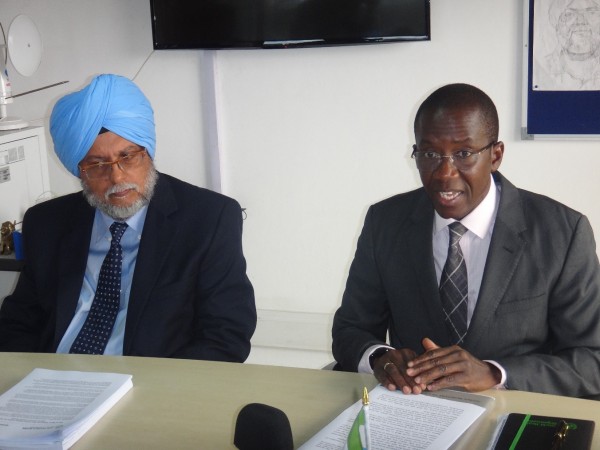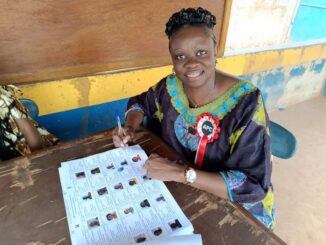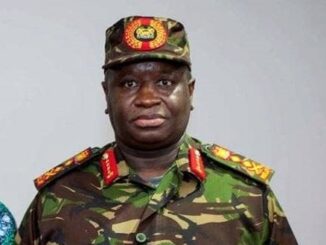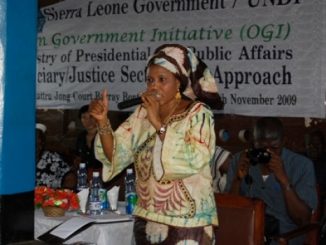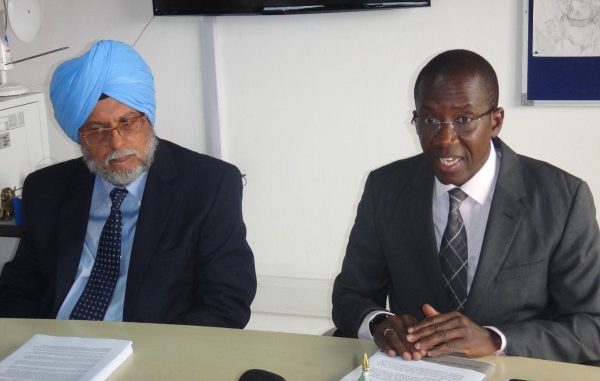
By Moses A. Kargbo
World Bank Country Manager, Parminder Brar and Health Minister, Dr. Abu Bakarr Fofanah briefing newsmen
Sierra Leone’s Minister of Health and Sanitation has praised the World Bank’s continued support toward the country’s recovery efforts after the Ebola Virus Disease (EVD) epidemic; support he said will help define and shape the nation’s health sector landscape and improve on health outcomes.
Dr. Abu Bakarr Fofanah was speaking today at a press conference jointly organized by the World Bank and the Ministry of Health to appraise the media of the outcome of the Bank’s recent Board meetings on Sierra Leone and its decision to approve a total funding of US$45.5 million to support two new projects in the health sector.
“The involvement of the World Bank in the development of Sierra Leone is an open secret. When the Ebola struck, the Bank was very flexible and quick to reprogram funds from the [Reproductive and Child Health Project (RCHP)] to support the response. Hence the first source of external funding for the response came from the Bank,” noted the Health Minister.
Dr. Fofanah lauded the Bank’s introduction of a “zero dollar component” to each new project in the health sector. “What this means is that both the Ministry and the Bank are now in a better position to support the government in the event of any unforeseen public health emergency, either of the same or a similar nature,” he added.
He commended the Bank for reprogramming the leftover of its support to the Post-Ebola Response – totaling about US$27 million – to unable his ministry develop a number of projects such as the ‘Service Level Agreement’, which is to improve the coordination between the Ministry and its numerous implementing partners; the ‘District Capacity Strengthening Project’, which enables the Ministry to bring in 43 additional doctors as a stop-gap measure to replace the hundreds of health care workers who lost their lives to the Ebola outbreak; and the ‘Postgraduate Training Project’, which is aimed at training medical specialists locally.
The Bank, on June 23 and June 28, 2016, approved the ‘Health Service Delivery and System Support Project’ and the ‘Regional Disease Surveillance Systems Enhancement Project (REDISSE)’ respectively.
The ‘Health Service Delivery and System Support Project’ is a US$15.5 million project co-financed through an International Development Association (IDA) credit of US$10 million and a US$5.5 million grant from the Ebola Recovery and Reconstruction Trust Fund. The objective of the project is to increase the utilization and improve the quality of essential maternal and child health services; and in the event of an eligible crisis or emergency, to provide immediate and effective response. The project will be implemented over a three-year period.
On the other hand, the REDISSE is a US$30 million program designed to strengthen weak human health, animal health, and disaster response systems to improve the preparedness of Sierra Leone and the West Africa region to handle future epidemics, and thereby minimize the national, regional, and potential global effects of such disease outbreak. The project emphasizes the need to strengthen the capacity of health systems, as well as veterinary services, of which disease surveillance is a key pillar, in order to improve health outcomes and reduce vulnerability.
World Bank Country Manager, Parminder Brar, voiced the Bank’s commitment to continue to support Sierra Leone’s recovery efforts, noting that the approval of the two new projects by the Bank’s Board was a testament to that.
He said the recent outbreak of the EVD and others provided evidence of the catastrophic health and economic impact of zoonotic diseases, noting that animal health was critical for human health.
“The [REDISSE] project will support Sierra Leone in strengthening its human and animal laboratory capacity, strengthen surveillance and information systems, improve preparedness and emergency response and human resource management. It will also greatly strengthen institutional capacity and provide the funding for effective linkages with local communities to identify and control the disease burden,” said Mr. Brar.
“Sierra Leone is particularly vulnerable with poor veterinary services and a weak health system. Personal spending is high. The country currently has the highest Out Of Pocket (OOP) spending as a percentage of Total Health Expenditures (THE) in West Africa at 76%.”
He said the projects were complementing the initiative of the President to develop a resilient health sector that will respond to the health needs of Sierra Leoneans.

